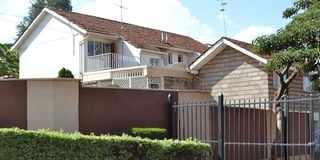Premium
Civil servants' housing rent to go up, Principal Secretary Hinga tells MPs

Civil servant houses in Kileleshwa, Nairobi.
Civil servants might soon dig deeper into their pockets as the government plans to triple their rent.
Those who have been paying as low as Sh30,000 monthly in rent for three-bedroomed houses located around Nairobi’s State House will pay triple if the National Treasury approves the proposal.
Housing Principal Secretary Charles Hinga told Parliament that he has written to the Treasury seeking approval to review the rent for the 56,892 civil servants’, a housing plan that has remained unchanged for the past 23 years.
The review will also see rent payable for low-cadre civil servants increased upwards from the current Sh1,000 per month.
“Rent for civil servants averages Sh2,200 but there are those who pay as low as Sh1,000 per month for a single room in Mbotela Estate along Jogoo Road to the super scale public servants who pay as high as Sh30,000 per month for three-bedroomed units along State House [Road],” Mr Hinga said.
“Super scale public servants living in upmarket areas like State House should pay between Sh90,000 and Sh100,000 per month.”
Appearing before the Public Accounts Committee to respond to audit queries for the State Department for Housing for the year 2021/22, Mr Hinga said he has written to the Treasury seeking permission to review the low rent.
“There is a need to increase rent. I have written to the National Treasury to allow us to relook at rental costs. We have not raised rent since the last review in 2001,” Mr Hinga said.
He told the committee chaired by nominated MP John Mbadi that the Ministry had not maximised collection of rent from the 56,892civil servants with an expected monthly rental income totalling Sh127,048,750.
Auditor-General Nancy Gathungu had raised the red flag over the State Department’s failure to collect potential annual rent of Sh1.524 billion assuming full occupancy of the 56,892 units.
Ms Gathungu said government houses for financial year 2021/22 amounted to Sh1.018 billion leading to under collection of Sh506.59 million of the full potential.
The audit revealed the State Department expected to receive Sh138.23 million in rent income from government houses occupied by county government staff in the 47 counties
Ms Gathungu said the total uncollected rent over the past two years amounted to Sh1.16 billion while the uncollected amounts for the financial year 2019/20 and earlier years have not been quantified.
Mr Hinga said government houses were categorised as institutional, police and pool houses owing to a number of factors including some that are in poor state of repair. He said the houses are further categorised into low, medium and high grade.
“It is true that the department recorded a shortfall of Sh506,585,000 against an expected total of Sh1,524,585,000 in rent from 56,892 houses during the year under review,” Mr Hinga said.
“The shortfall arose after Sh16.99 million was deducted from the tenants by various Ministries, Departments and Agencies (MDAs) but was not remitted to the State Department [of housing].”
Mr Hinga said the demand letters were addressed to the particular MDAs including the State Department of Interior and that of Tourism, which account for the bulk of the non-remitted rent.
The PS asked Parliament to intervene and order a special audit on all MDAs that have collected rent and failed to remit the same arguing it is illegal for entities to spent money not appropriate in the budget.
“It is irregular for any MDA to spent money outside its budget. There are rent deductions by employees that should be remitted to the State Department for Housing,” Mr Hinga said.
He said a total of Sh35.65 million was not collected from 1,714 houses that had been boarded to various institutions while Sh42.47 million was not collected from 1,501 houses that were irregularly alienated and thus not attracting rent.
Mr Hinga said various houses were not occupied due to their dilapidated condition. “These houses could not be refurbished within the financial year due to cashflow constraints. As such, rent was not received from such houses across the country,” he said.
The PS said there were times when houses were not occupied immediately they were vacated. He explained this as caused by delayed allocation to the next tenant especially in areas with security challenges.
“In order to scale up rent collection efficiency, we have instituted several measures which have resulted in a steady increase in overall annual collection over the last four years,” Mr Hinga said.
“We are currently rolling out an Enterprise Resource Planning system for revenue reconciliation and rent collection for both at Estate, Civil Servants Housing Scheme and Slum Upgrading Programme.”





